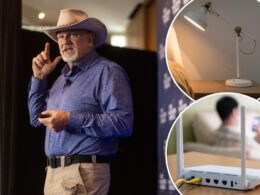Mark Zuckerberg’s private emails about Facebook’s purchase of Instagram more than a decade ago came back to haunt Meta at its historic antitrust trial this week – and the outcome of the case could ultimately hinge on whether a judge buys his attempts to explain them away, experts told The Post.
The Federal Trade Commission presented a series of explosive private messages, including a 2012 exchange in which Zuckerberg said buying Instagram would “neutralize a competitor” — a turn of phrase that FTC lead attorney Daniel Matheson labeled a “smoking gun”.
In another 2018 message, the tech tycoon mused on whether Meta should “consider the extreme step of spinning Instagram out” to get ahead of regulators.
“As calls to break up the big tech companies grow, there is a non-trivial chance that we will be forced to spin out Instagram and perhaps Whatsapp in the next 5-10 years anyway,” Zuckerberg said in the 2018 document.
The FTC, which wants to force Meta to sell off Instagram and WhatsApp, has argued that Zuckerberg’s emails are proof of the company’s use of a “buy or bury” strategy to crush upstart apps before they could pose a legitimate threat to its social media empire. Zuckerberg was the first witness called to the stand on Monday and faced a grilling for three straight days.
Zuckerberg’s private emails “represent the strongest part of the government’s case,” according to Rebecca Haw Allensworth, an antitrust law expert and professor at Vanderbilt Law School.
“I do think this is a dark cloud that will follow Meta – at least through this whole proceeding, which could take several years,” Allensworth added.
The candid messages provide a rare glimpse behind the mask for a notoriously buttoned-up Zuckerberg – and antitrust experts have long considered them to be some of the most damning evidence of Meta’s anticompetitive tactics. As far back as 2019, The Post reported that FTC had obtained a “spectacular document” as it weighed whether to challenge Meta’s acquisitions.
Aside from during Zuckerberg’s questioning, the emails were heavily featured during the FTC’s opening argument accusing Meta of having an illegal monopoly. US Judge James Boasberg of the Eastern District of Virginia will decide the outcome of the non-jury trial.
The company bought Instagram for $1 billion in 2012 and WhatsApp for about $19 billion in 2014.
The FTC showed a 2011 email in which Zuckerberg told an underling that Facebook was “getting our ass kicked” by Instagram. Later, in 2012, Zuckerberg worried that “lnstagram could hurt us meaningfully” and was “pretty threatening to us.”
“Messenger isn’t beating WhatsApp, Instagram was growing so much faster than us that we had to buy them for $1 billion,” Zuckerberg said in another November 2012 email to then-Facebook COO Sheryl Sandberg.
In a 2013 email, Zuckerberg grumbled that he was “disappointed and frustrated” that Snap co-creator Evan Spiegal had turned down a $6 billion acquisition offer.
Other emails showed Zuckerberg mulling a WhatsApp acquisition due to the potential risk that a rival messaging apps like China-based WeChat were “trying to build social networks and replace us.” Other Facebook executives privately worried that Google would beat Facebook to the punch and buy WhatsApp first.
Zuckerberg, meanwhile, denied that the emails showed anticompetitive intent and were instead as a sign of his constant paranoia that competitors would beat Facebook. At one point, he described seeing TikTok as a “highly urgent” threat to Meta as it gained popularity in 2019.
“What’s that Andy Grove quote? ‘Only the paranoid survive,’” Zuckerberg said in a reference to the former CEO of Intel. “It’s my job to understand things that are adjacent to us and what’s going on in the industry.”
Referring to his 2018 email about a possible preemptive Instagram spinoff, Zuckerberg said he needed to “take into account the direction that the politics seemed to be going at the time” as his company faced pressure on Capitol Hill.
On Instagram itself, Zuckerberg argued that his takeover helped rather than hurt its growth, which may never have occurred without Facebook’s backing.
The FTC has argued that Meta is dominant over a narrow market for social media companies that are built on friends-and-family connections, with Snapchat as its only direct competitor. Other apps like video-focused TikTok are in separate categories, according to the agency.
Zuckerberg and Meta’s attorneys have pushed back, insisting that Meta faces fierce competition from TikTok, YouTube and Apple’s iMessage for user attention. On the stand, Zuckerberg said Meta has focused less and less on its friends-and-family origins over time.
A Meta spokesperson said the FTC’s case “ignores reality.”
“More than 10 years after the FTC reviewed and cleared our acquisitions, the Commission’s action in this case sends the message that no deal is ever truly final,” the spokesperson said in a statement. “It’s absurd that the FTC is trying to break up a great American company at the same time the Administration is trying to save Chinese-owned TikTok.”
The case will likely turn on which definition of Meta’s market is determined by the judge to be more accurate.
“The market definition and monopoly power issues are huge and unless the government can succeed there, they cannot win,” added Allensworth. “On that front, Zuckerberg did well painting his company as being very focused on competition and in portraying the chaos of innovation and start-ups.”
Despite his denials, Zuckerberg took steps to avoid the trial entirely – including making at least three trips to the White House while trying to convince President Trump to settle the case.
Earlier this week, the Wall Street Journal reported that Zuckerberg had offered a scant $450 million to settle the case – a fraction of the $30 billion sought by FTC Chairman Andrew Ferguson.
“FTC attorneys did a great job exposing the monopoly strategy Meta has had for years,” a former FTC official who recently left the agency and requested anonymity to discuss the case told The Post. “These emails indicate a clear intent to buy off potential competitors and real internal concern with the legal implications of these anticompetitive decisions.”
Antitrust advocates say Zuckerberg’s testimony and the emails themselves, aside from playing a key role in the FTC case, will have wide-ranging repercussions as Meta faces ongoing scrutiny from Congress and federal regulators.
“These emails are smoking-gun evidence that Mark Zuckerberg knowingly gobbled up competitors to smother threats before they emerged. Meta deserves to get the book thrown at them for breaking the law,” said Sacha Haworth, executive director of The Tech Oversight Project.
“This trial has already been an embarrassment for Meta, and it should come as no surprise why Zuckerberg was trying to convince Trump to call the whole thing off,” Haworth added.








